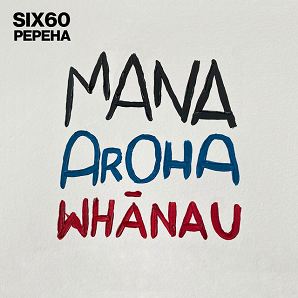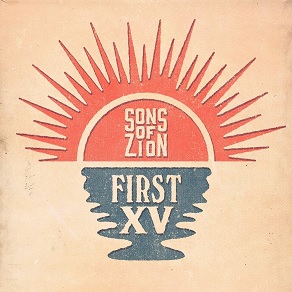
The music of New Zealand has been influenced by a number of traditions, including Māori music, the music introduced by European settlers during the nineteenth century, and a variety of styles imported during the twentieth century, including blues, jazz, country, rock and roll, reggae, and hip hop, with many of these genres given a unique New Zealand interpretation.
Traditional Māori music, or pūoro Māori, is composed or performed by Māori, the indigenous people of New Zealand, and includes a wide variety of folk music styles, often integrated with poetry and dance.

Revival is the debut studio album by New Zealand band Katchafire, released on 4 June 2003. Released after the success of the band's debut single "Giddy Up" (2002), the album was a commercial success, and led to a new wave of popular New Zealand reggae musicians.
1814 is a reggae band from New Zealand.

"Sensitive to a Smile" is a single from the New Zealand reggae band Herbs from the Sensitive to a Smile album. The single reached #9 in the New Zealand chart.
The Official Aotearoa Music Charts, formerly the Official New Zealand Music Chart, is the weekly New Zealand top 40 singles and albums charts, issued weekly by Recorded Music NZ. The Music Chart also includes the top 40 Hot Singles chart, the top 20 New Zealand artist singles and albums, the top 20 Hot New Zealand singles, and top 10 compilation albums. All charts are compiled from data of both physical and digital sales from music retailers in New Zealand.

Ria Hall is a Māori recording artist, singer-songwriter, television presenter, and political candidate. She has released two solo albums, Rules of Engagement (2017), which topped the Official New Zealand Music Chart shortly after its release, and Manawa Wera (2020). Her work reflects Māori society and history, and Hall regularly sings in Māori as well as English.
Tomorrow People is a seven-piece New Zealand reggae band that formed in 2010. Their debut album One was released on 1 June 2012 under Illegal Musik / Warner Music and debuted at Number One on the New Zealand charts. It was later certified Gold. They have also released an EP called One.5 in 2014, and a full-length album called Bass & Bassinets in 2015. Their EP "BBQ" Reggae was released in January 2018 and debuted at number one in New Zealand.

Waiata / Anthems is compilation album by New Zealand artists, whereby they re-record previous songs from English to Māori language. It was released in New Zealand 6 September 2019 and it debuted at number 1 on the Official New Zealand Music Chart.

"Tukituki Te Manawa" is a song by New Zealand band Drax Project, performed in Māori language. It was the band's second song released as a part of the Waiata / Anthems project, with their first being a re-release of their 2017 single "Woke Up Late" for the 2019 Waiata / Anthems compilation album. An unreleased song by the band originally written in English, "Tukituki Te Manawa" translated into Māori by Hinewehi Mohi and Sir Tīmoti Kāretu and released on Christmas Day 2020. In 2021, the song was the subject of an episode of a TVNZ OnDemand documentary series, documenting the creation of music for Waiata / Anthems.

"Pepeha" is a song by New Zealand band Six60, performed bilingually in English and Māori. "Pepeha" is the band's second song to be recorded in Te Reo Māori, and was released as a single in 2021 to coincide with Te Wiki o te Reo Māori. The song was written by Six60 band members Marlon Gerbes and Matiu Walters, alongside Te Reo experts Mahuia Bridgman-Cooper, Jeremy Tātere MacLeod and Sir Tīmoti Kāretu.
Sons of Zion is a six-member New Zealand reggae band who formed in 2007 in Pakuranga, Auckland. They became widely famous in New Zealand in early 2018, due to the popularity of their single "Drift Away".
Maimoa is a New Zealand musical group. Formed from current and former presenters from the Māori Television show Pūkana, the group debuted in 2016 with the single "Maimoatia", which was released to celebrate Te Wiki o te Reo Māori. Since their debut, the group has continued to release pop singles sung in te reo Māori, including "Wairua" (2017), a viral hit produced by members of the New Zealand band Sons of Zion.

"35" is a song by New Zealand youth choir Ka Hao featuring musician Rob Ruha. "35" was the group's first single, and preceded the release of their debut album Ka Hao: One Tira, One Voice. The song, performed primarily in Māori, was a sleeper hit, first entering the New Zealand Singles Chart in Te Wiki o te Reo Māori in September 2021 and peaking at number 12 in November. "35", alongside New Zealand band Six60's song "Pepeha", are the best performing songs sung in Māori since Stan Walker's "Aotearoa" (2014).
"Taera" is a Māori language song by New Zealand musician Rob Ruha. It was released as the main single from his third studio album Preservation of Society on 8 October 2021. The song was the 7th most commercially successful song sung in Te Reo Māori for 2021.

"Ka Taria" ("Waiting") is a song by New Zealand musicians Rob Ruha and Drax Project. A song sung in Māori and English, it was released as a single during Te Wiki o te Reo Māori. It was the third Drax Project song released as a part of the Waiata / Anthems project, following "I Moeroa / Woke Up Late", and Ruha's second, after "35". The song debuted at number 17 on the New Zealand Hot Singles chart, the highest position by a New Zealand artist's song that week. By the end of 2022, it was the 20th most successful Te Reo Māori song of the year in New Zealand.

"Love on the Run" is a song by New Zealand band Sons of Zion, performed in collaboration with singer Jackson Owens, released as a single in June 2021. In September 2021 for Te Wiki o te Reo Māori, the band re-recorded the song as "He Aroha Hinemoa / Love on the Run". Both the English and Māori language versions of the song were hits in New Zealand.

First XV is a compilation album released by New Zealand band Sons of Zion in October 2022, as their final release through Sony Music New Zealand. The album compiles songs from their albums Universal Love (2013), Vantage Point (2018), and other singles by the band released between 2014 and 2022.
Corrella is an eight-member New Zealand roots reggae band. Formed in 2017 by members of the Royal New Zealand Navy in the North Shore, Auckland, suburb of Belmont, the group came to prominence in New Zealand in 2023 with the single "Blue Eyed Māori". Lead singer Pipiwharauroa Campbell grew up speaking Māori as his first language, and the band has released two songs in te reo Māori, "Raumati" (2022) and "Ko Au " (2023).

Road from 26 is the debut studio album by New Zealand roots reggae band Corrella, released on 26 May 2023. The album features the single "Blue Eyed Māori", which was one of the top performing singles by a New Zealand artist for 2023.












